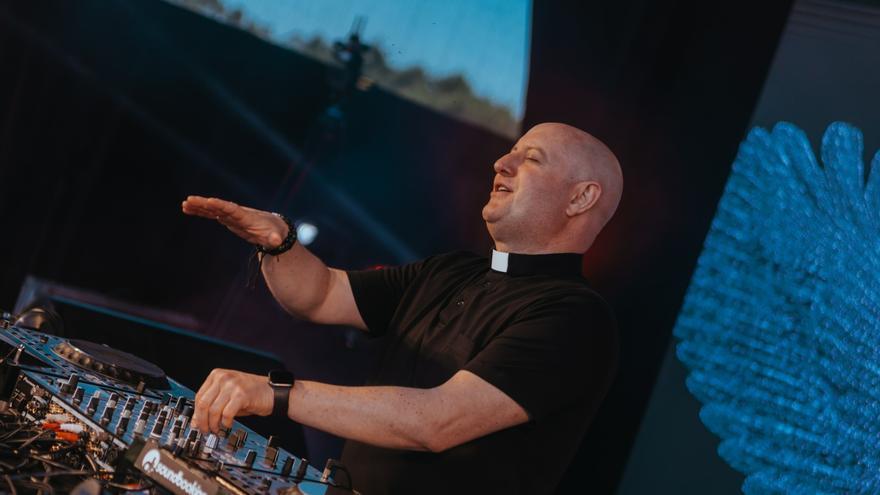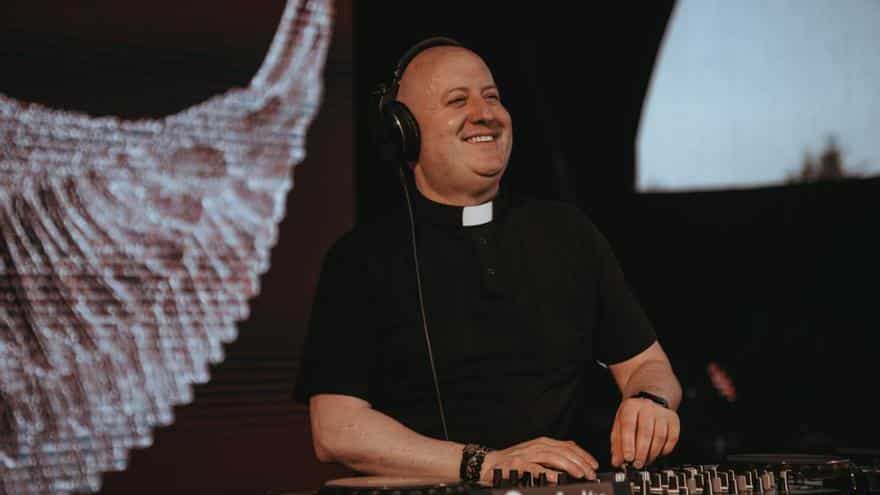The scene went viral immediately: a video that starts with the hands of a DJ spinning a great track. The shot opens to reveal that the artist is dressed as a priest. In fact, he is a Portuguese priest. He is playing a tremendous techno session at 7 o’clock in the morning. Not at an after party, not at a rave, not at a summer festival. The DJ is waking up the young Christians attending World Youth Day (WYD) in Lisbon. “What a saintly tune,” some would say. And they have never been so right.
In this plumbeous informative summer, laminated in Spain only by the elections and a crime in Thailand, one of the media characters has been Guilherme Guimaraes Peixoto. Better known by his stage name: Father Guilherme. A priest from Guimaraes (Portugal) who has become popular in his country for his DJ facet. He has already performed in some of the biggest Portuguese clubs and accumulates hundreds of thousands of followers in his social networks.
Now he has surprised the world by playing an electronic music session in a place as unexpected for such a show as the great world festival of Catholic youth. El Periódico de España, part of the Prensa Ibérica group, was the first newspaper to talk to him after his memorable performance in Lisbon, where he played a 30-minute set of tracks produced by himself.
Question: Quite a festival, isn’t it, Father?
Answer: It was fabulous. I couldn’t stop laughing watching so many people dancing and enjoying themselves. I read that we had the biggest slumber party in the world (laughs).
Q: Man, depending on how you looked at it, it looked like a gigantic rave. An estimated 1.5 million people passed through WYD.
A: The best thing is that nobody expected it. On the poster it only said that Father Guilherme was performing. And man, in Portugal a lot of people know me. But of course, at WYD there were people from many parts of the world who didn’t know me.
Q: There are many of us who did not know you; who did not know that our Portuguese neighbors have a DJ priest. How did your relationship with the Catholic Church begin? Because I read somewhere that it was a promise your mother made when you were a child and fell ill?
A: That story is not exactly like that. I’ll explain it to you. When I was young, looking for my baptismal certificate, I realized that I had been baptized in the hospital chapel a few days after I was born. That is not normal. A child is baptized at two or three years old and in a church. I asked my mother and she told me that a few days after I was born, the doctor said I was dying. That I was not going to survive that night. My family preferred that I spend my last hours at home. I was baptized and we all left the hospital. I was visited by my family, my neighbors to say my last goodbye. My mother told God that if he saved her son, she would offer him to him.
Q: And I see that he was saved?
A: I was saved, but it is not true that my mother forced me to become a priest for that reason. It’s not true that my parents pressured me. It was my own thing. Since I was a child I had that vocation. I always wanted to be a priest, ever since I saw the parish priest of my town, who was always helping the poorest, always doing social work. There was a gypsy camp in the village and he managed to befriend them, help them, get them social aid. There was never a problem of xenophobia or coexistence there. And that was a role model for me.

Q: So much so that you were ordained a priest.
A: In 1999 it was. Do you know what I did with the first salary I was paid in the church?
Q: No idea
A: To become a member of Vitoria de Guimaraes, my hometown team. Because I am very fond of soccer and a big fan of my team. My middle name is Guimaraes, I’m from Guimaraes and I’m from Vitoria de Guimaraes.
Q: You are an atypical priest?
A: I am also a military man. I have the rank of Lieutenant Colonel in the Portuguese Army. I was a military priest in three different camps. I also spent 6 months in Afghanistan in 2010 and another 6 months in Kosovo in 2012.
Q: Soccer player, military… and DJ – how did that start?
A: Back in 2006. I was stationed at a parish that had a lot of debt. And, meeting with the parish committee, we decided to do a series of activities to raise money. One of them was a karaoke for the young people to sing. What happened? They only asked for romantic songs and people ended up falling asleep. “You’ve ruined the party,” I told them. And what I did was to start playing other kinds of music during the intermissions.
Q: Another kind of music?
A: Portuguese rock, Gun’s ‘N Roses, AC/DC… i even played Ramnstein for them! And that, on the one hand, cheered up the event quite a bit. And on the other hand, it encouraged me to continue playing music, because I liked the experience. Then I started to get little by little the equipment I saw I needed. I don’t have a controller? Then I bought one. With that and the free version of a computer program called Virtua DJ, I could play music.
Q: And that’s when you started putting on shows?
A: No, that was useless (laughs). The only thing I could do was to play a song and, when it was over, another one would come in. No mixes. But I was very interested in that and I started buying more equipment. I also started experimenting with video. But I ended up realizing that, if I really wanted to DJ, I wasn’t going to learn on my own. I had to join an academy. I enrolled in a Portuguese school called ProDJ and there I really learned and took a leap in quality.
Q: What was your favorite style?
A: I started with EDM (Electronic Dance Music). But after the pandemic everything changed. I did a lot of things by video, by live stream. And I said “I’m going to do whatever I want.” I did church stuff, but also humorous stuff. I did a program with some friends called “Não é capaz” (You are not capable) and it consisted of doing challenges that people asked for. For example, “You are not capable of going dressed as a priest to the pharmacy to buy condoms”. Or to eat insects. I’m just telling you that one of the participants ended up with a tattooed heart (laughs).
Q: And in musical matters he also did whatever he wanted.
A: That’s right. I started experimenting with new styles. Dance, progressive, afrobeat, techno. Mostly techno. Melodic techno, which is what I play the most now. And I started producing my own tracks.
Q: Are the ones you played the morning of WYD your own tracks?
A: All of them. And all of them related to the Christian experience. The first one in an opening in G with Alleluia and Gloria two hymns: Alleluia and Gloria. The second is called Infinite Light and is based on Pope Francis’ encyclical ‘Laudato Si’. The third is entitled ‘Lift up the fallen’ and is also based on another Pope Francis encyclical, “Fratelli tutti”. the fourth is inspired by a chant from Spain!
Q: Tell me more about that….
A: In two parishes of the Archdiocese of Braga, Santiago de Amorim and San Miguel de Laúndos, we received young people from two parishes in Madrid: Santa Genoveva and Somosaguas respectively. And those kids had that song that says: “This is the Pope’s youth!”, and that’s the name of the fourth song of the set. The fifth and last one is called “Non abiatte paura” and is based on the first homily of John Paul II.
Q: But you have many of your own compositions, was it difficult to choose?
A: Very much so! But, above all, because of the duration. They told me to prepare a 30-minute session and I told them, “What do you mean, 30 minutes! That this kind of songs that I play last 7 or 8 minutes, that they were going to fit a couple or three. So I had to work to reduce the time of the session.
Q: How did that opportunity come to you, and where did the crazy idea of putting on a techno session at a Catholic rally come from?
A: It comes from a few months before, in the Archdiocese of Viana do Castelo. Before celebrating WYD, they have to get to the place where the symbols, such as the Cross, are going to be celebrated. In Viana do Castelo they decided to organize a party to receive these symbols. They invited me, I started to play and they must have liked it, because they proposed me this session at WYD. I played a session around 7 a.m. to wake people up, before Pope Francis showed up. As I said, we hadn’t told anyone what I was going to do. Whoever knew the name of Father Guilherme would know. But nobody expected it.
Q: Happy with the result?
A: Very much so. I really enjoyed seeing the young people surprised, dancing. Earlier I had been asked by the organization if I wanted a microphone, but I declined. I had nothing to say. The music spoke for me and said it all.
Q: Surprising combination. Catholic music has never been popular with the youth and techno has always been associated with drug-fueled parties.
A: Yes, the stereotype that at night parties there are drugs, sex and alcohol. In reality there are people. Those of the day and those of the night are the same. If you are a hooligan by day, you are a hooligan by night. What I see is the possibility of bringing people a cross-cutting message of tolerance, of making a better world. Music helps us to have a sense of peace and joy and that is what I want to transmit.
Q: Next stop, Ibiza?
A: I go there every year! Not to DJ yet, eh. I would love to play there. But for the moment I’ve only gone to see DJs that I like. I had an unparalleled experience at Circoloco nightclub (former DC-10) because there was a lineup I loved, the session started at 6 p.m., it was outdoors and there was no video. Just the connection with the music. Another time I went to Privilege to see Carl Cox and my friends had other plans. I told them “if you want to find me, I’ll be watching Carl Cox in the second row”. And yes, they had to come and find me there. To the second row of where Carl Cox was playing.
Q: Is that the church’s solution to attract the faithful? Playing techno at mass?
A: (Laughs) No. I’m very traditional about that. I believe that each thing has its time and place. In mass you have to sing the songs that are sung in mass. But outside, music is a very powerful vehicle to transmit messages of peace, tolerance, against xenophobia and discrimination. These are the messages we want to transmit from the Church and music can do it. Because on the dance floor we are all equal.
For the full article, please visit Diario de Ibiza website here.

